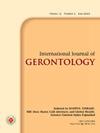Factors Determining Mortality in Geriatric Palliative Care Patients
IF 0.3
4区 医学
Q4 GERIATRICS & GERONTOLOGY
引用次数: 1
Abstract
Background: As life expectancy at birth increases, the elderly population is growing, both in Turkey and globally. The aim of this study was to investigate the factors associated with 12-month mortality in patients receiving geriatric palliative care. Methods: Geriatric inpatients who were treated for 48 hours or more in the palliative care unit of our hospital between January 2016 and January 2017 were included in the study. Results: A total of 233 geriatric palliative care patients (50.6% women) with a mean age of 77.6 ± 11.0 were included in the study. Eighty of the patients in our study died while in palliative care. Chronic kidney disease (CKD) and chronic obstructive pulmonary disease (COPD) were significantly more common among the deceased patients. Of the 153 surviving patients, 94 (61.4%) died within 12 months of discharge and 59 (38.6%) survived beyond 12 months. Presence of CKD was associated with a 2.17-fold reduction in survival time and albumin level < 3.2 mg/L with 2.12-fold reduction in survival time. In addition, post-discharge 12-month survival time was 1.80-fold shorter in the presence of solid organ malignancy, 2.06-fold shorter with APACHE-II score > 20.5, 1.60-fold shorter with Charlson Comorbidity Index (CCI) > 6.5, and 1.98-fold shorter with albumin levels < 3.2 mg/L. Conclusion: CKD and low albumin were identified as independent risk factors for reduced hospital survival time. Independent risk factors for shorter post-discharge survival time included the presence of solid organ malignancy, high APACHE-II score, high CCI, and low albumin level.决定老年姑息治疗患者死亡率的因素
背景:随着出生时预期寿命的增加,土耳其和全球的老年人口都在增长。本研究的目的是调查与接受老年姑息治疗的患者12个月死亡率相关的因素。方法:选取2016年1月至2017年1月在我院姑息治疗单元住院48小时及以上的老年患者为研究对象。结果:共纳入233例老年姑息治疗患者(女性50.6%),平均年龄77.6±11.0岁。在我们的研究中,有80名患者在姑息治疗期间死亡。慢性肾脏疾病(CKD)和慢性阻塞性肺疾病(COPD)在死亡患者中更为常见。153例存活患者中,94例(61.4%)在出院12个月内死亡,59例(38.6%)存活超过12个月。CKD的存在与生存时间减少2.17倍相关,白蛋白水平< 3.2 mg/L与生存时间减少2.12倍相关。此外,存在实体器官恶性肿瘤的患者的出院后12个月生存时间缩短1.80倍,APACHE-II评分> 20.5的患者生存时间缩短2.06倍,Charlson合并症指数(CCI) > 6.5的患者生存时间缩短1.60倍,白蛋白水平< 3.2 mg/L的患者生存时间缩短1.98倍。结论:CKD和低白蛋白是缩短住院生存时间的独立危险因素。较短的出院后生存时间的独立危险因素包括存在实体器官恶性肿瘤、高APACHE-II评分、高CCI和低白蛋白水平。
本文章由计算机程序翻译,如有差异,请以英文原文为准。
求助全文
约1分钟内获得全文
求助全文
来源期刊
CiteScore
0.60
自引率
0.00%
发文量
0
审稿时长
6-12 weeks
期刊介绍:
The Journal aims to publish original research and review papers on all fields of geriatrics and gerontology, including those dealing with critical care and emergency medicine.
The IJGE aims to explore and clarify the medical science and philosophy in all fields of geriatrics and gerontology, including those in the emergency and critical care medicine. The IJGE is determined not only to be a professional journal in gerontology, but also a leading source of information for the developing field of geriatric emergency and critical care medicine. It is a pioneer in Asia.
Topics in the IJGE cover the advancement of diagnosis and management in urgent, serious and chronic intractable diseases in later life, preventive medicine, long-term care of disability, ethical issues in the diseased elderly and biochemistry, cell biology, endocrinology, molecular biology, pharmacology, physiology and protein chemistry involving diseases associated with age. We did not limit the territory to only critical or emergency condition inasmuch as chronic diseases are frequently brought about by inappropriate management of acute problems.

 求助内容:
求助内容: 应助结果提醒方式:
应助结果提醒方式:


